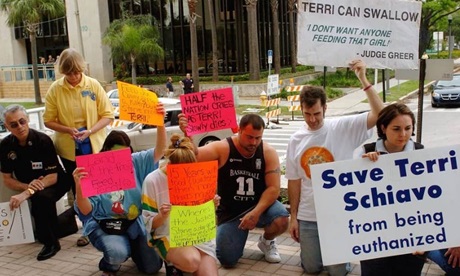Hard cases, as the famous legal maxim holds, make bad law.
The Vatican served up a reminder of the point this week with a new “little end-of-life lexicon,” which not-so-subtly amends an earlier Vatican ruling on the issue of withdrawing artificial nutrition and hydration from chronically ill patients 17 years ago.
New end-of-life lexicon
The new lexicon was issued by the Pontifical Academy for Life.
While it doesn’t have the force of law or express any new teaching, it nevertheless clearly marks a departure from the position taken by the Vatican in 2007, which was framed in the wake of the anguished Terri Schiavo case in the United States.
The lexicon, by way of contrast, so far has been issued only in Italian, and doesn’t appear linked in a direction fashion to any current high-profile case.
The Schiavo case
Though it may be difficult to remember now, the Schiavo case was perhaps the most notorious, and controversial, end-of-life debate in the United States throughout the late 1990s and early 2000s.
It became a political football during the 2004 election, in part because it was unfolding in Florida, a premier presidential battleground state, which at the time was governed by Jeb Bush, the brother of President George W. Bush.
To recap, Terri Schiavo went into cardiac arrest at her home in St. Petersburg, Florida, in 1990, experienced massive brain damage, and was eventually diagnosed as being in a persistent vegetative state.
For the next several years various therapies were attempted without a favorable result, and in 1998, Schiavo’s husband decided to remove the feeding tube which was keeping her alive.
That decision was immediately challenged by Schiavo’s parents, Robert and Mary Schindler.
Among other things, they insisted that Schiavo was a devout Roman Catholic and would not have wished to defy Church teaching, including the idea that withdrawing food and water from a patient is tantamount to a form of euthanasia.
The clash between husband and parents triggered an explosive legal and political debate which played out for the next seven years, until the feeding tube was definitively withdrawn and Schiavo died on March 31, 2005.
The case aroused wide and passionate Catholic activism, often driven less by the Church’s official leadership than by a sprawling, informal horizontal network of pro-life activists and movements. Read more
- John L. Allen Jr. is the editor of Crux, specializing in coverage of the Vatican and the Catholic Church.
News category: Analysis and Comment.




